Best portable air conditioners: Stay cool anywhere you need
Pick from the best portable air conditioners to make this summer special - and far less sweaty
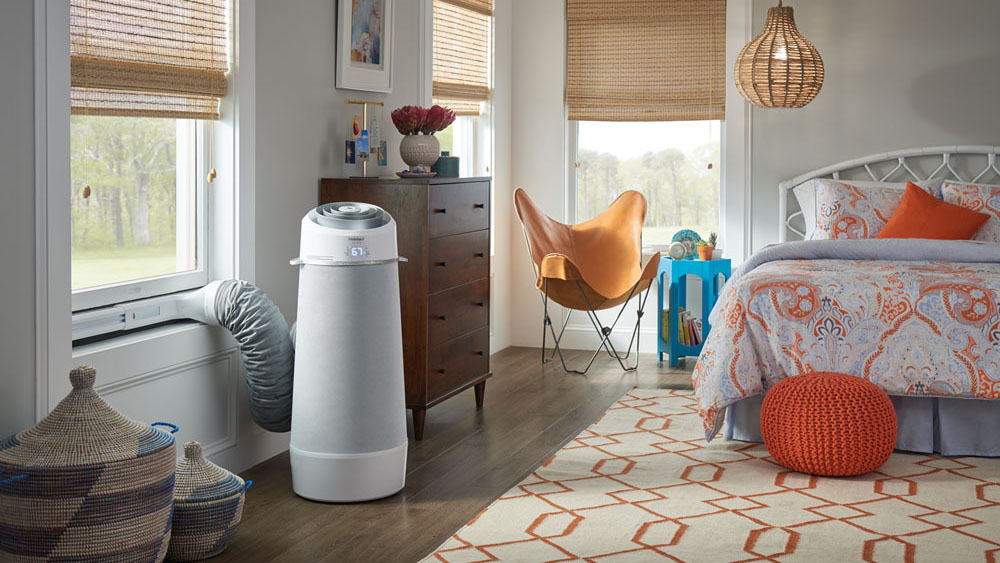
The best portable air conditioners can be the difference between brain fog levels of discomfort and a clear headed and happy experience this summer. So while they do pay for themselves by improving your quality of life in the hot times, picking the right one to do that without breaking the bank is the key. That's where this guide is going to help.
The best portable air conditioners, despite being mobile, do come in a wide variety of sizes and - as such - in power abilities. So you may want to think about the size of the space you need to cool before beginning to look at units of that power output and size. Use too much and it'll cost you longer term in running costs as well as the unit itself up front.
How you plan to use the air conditioner is also important when factoring in how much power you need. Do you just want a quiet unit for your bedroom so you sleep well or are you looking to cool a hot home gym in the height of winter? And that portability could be important too based on how you want to move it - from room to room or is this coming with you to the office?
The way to measure power output is in BTU, or British Thermal Units. The higher this number the greater the cooling ability of the unit. It's also worth thinking about extra features to speed up the rate of cooling in the room, if you're going to need this in a hurry. Or, perhaps, a timer or app controlled model could do that job by allowing you to plan ahead and have the space cool for when you need it.
Some have night modes for quiet running, others let you control fan speed directly and a few units even have dehumidifier modes built right in.
If it's more whole home cooling you're after then check out the best central air conditioning units or the best window air conditioners. Otherwise read on to find the best portable air conditioners out there right now.
The best portable air conditioner
1. Honeywell HL14CHESWK: Best portable air conditioner overall
Why you can trust Top Ten Reviews
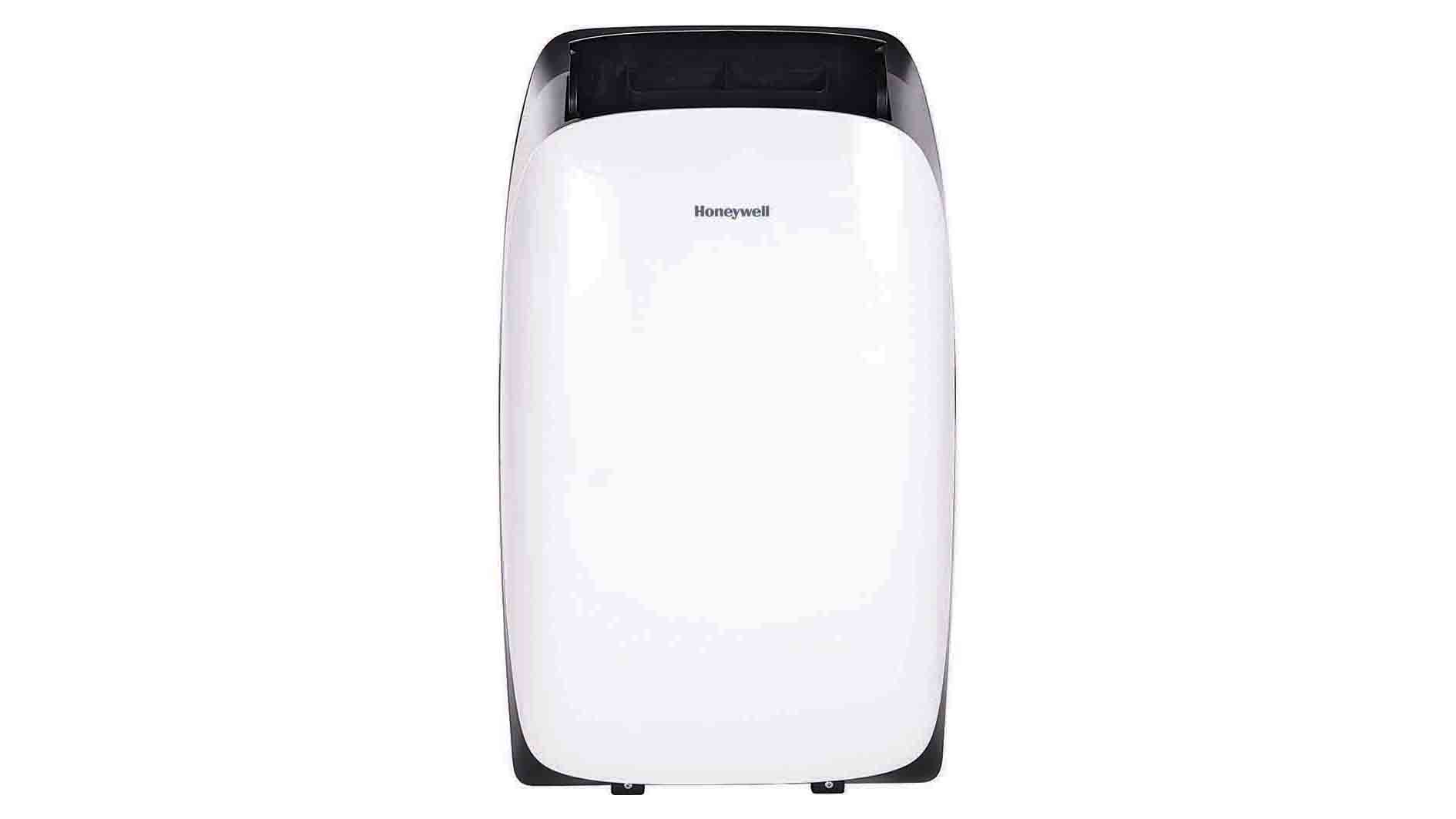
Honeywell HL14CHESWK
Our expert review:
Specifications
Reasons to buy
Reasons to avoid
The Honeywell HL14CHESWK is a powerful portable air conditioner that's able to clear heat from room spaces of up to 500 square feet thanks to its 1,200W of power that's good for 14,000 BTU.
This will also clear a huge 4.65 pints per hour of water from the air when in dehumidifying mode. It's weightier than some, at 74lbs, but comes with wheels for easy movement.
That said, you also get a window installation kit so it can quite happily stay in one place working away relatively quietly at 52 dB. This also has a special skill as, in the colder months, it can even work as a heater to warm up the space by reversing the air flow.
- Read our Honeywell HL14CHESWK review
2. Whynter Dual Hose Portable AC Unit: Best portable air conditioner for large spaces
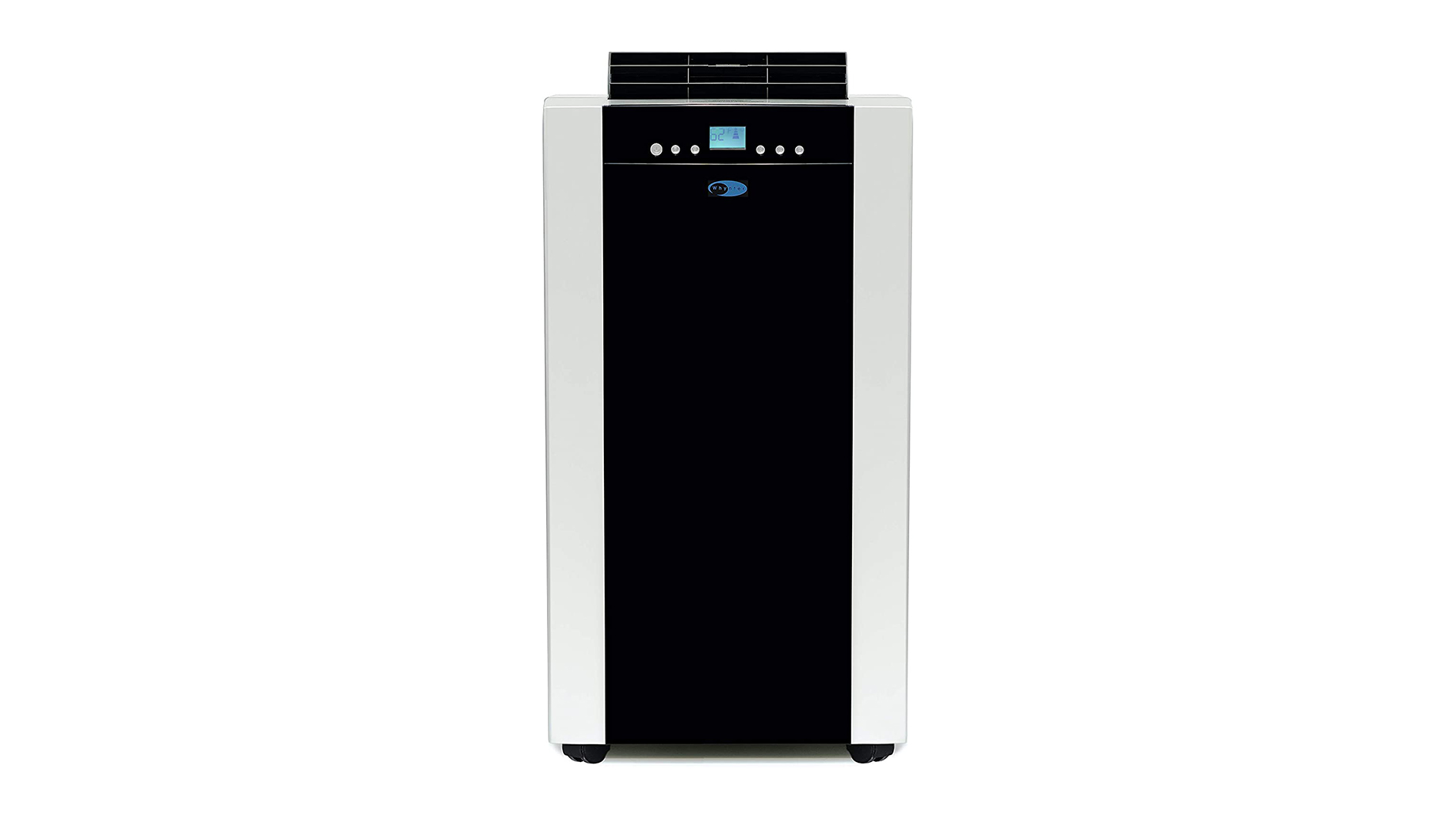
Whynter Dual Hose Portable Air Conditioner
Our expert review:
Specifications
Reasons to buy
Reasons to avoid
The Whynter Dual Hose Portable Air Conditioner is a cooling powerhouse. With 14,000 BTU, it’s a pretty powerful model, which explains why it can pump out enough cool air to treat 500 square feet.
At the same time, the digital controls make this unit look sleek and modern, which is a good job, as the device is slightly on the clunky side, weighing in at 80 lbs.
Nevertheless, this is an efficient unit that comes with built-in auto drain technology to collect and recycle moisture from the air and a dual hose system to cool down rooms quicker.
Not forgetting its smart features, the timer function is a handy addition for anyone who likes to take charge of their home’s temperature throughout the day. The remote control is also a convenient way to switch between the three modes, including a useful dehumidifier mode.
3. Frigidaire Gallery FGPC1244T1: Best portable air conditioner for stylish homes
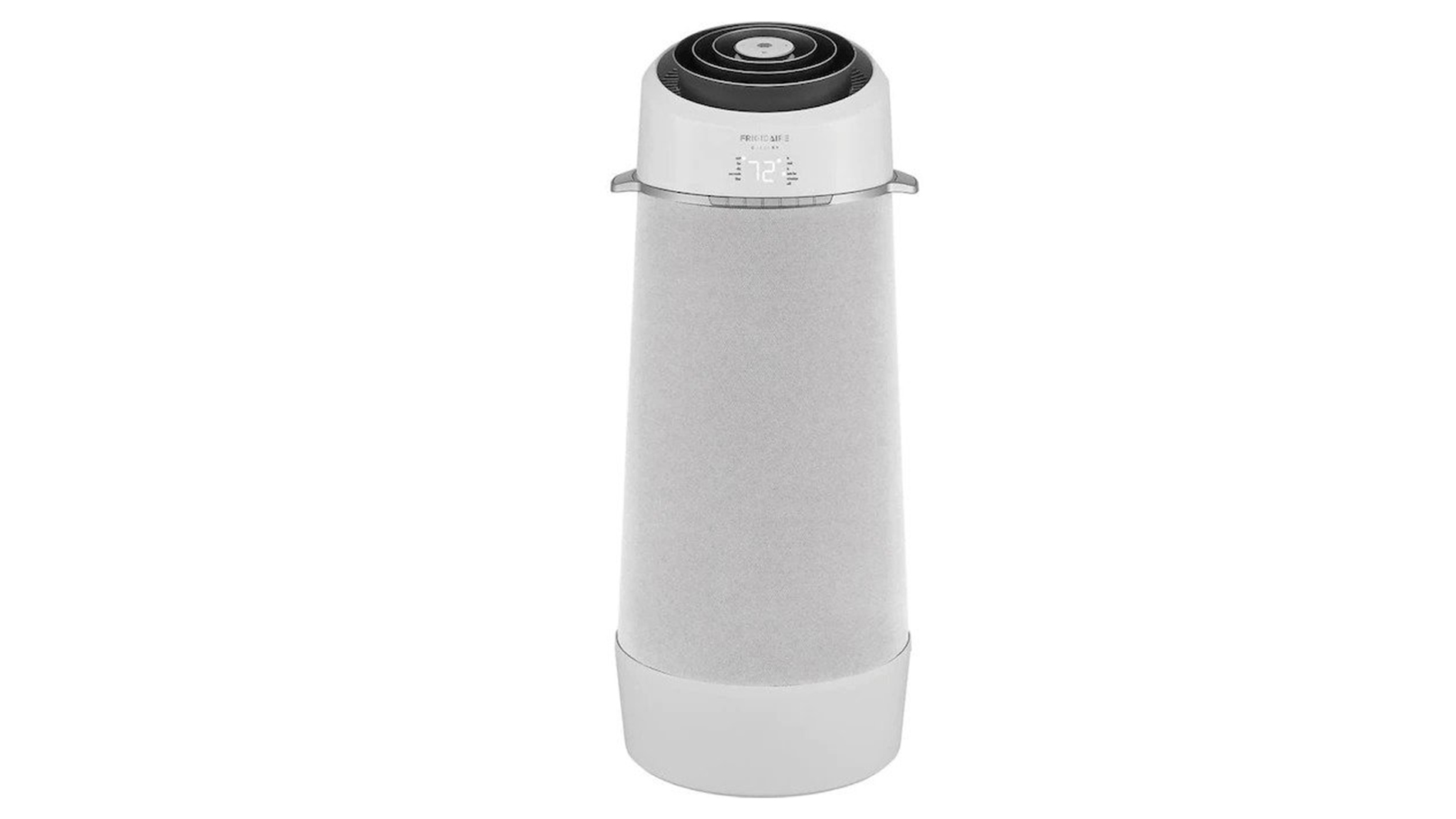
Frigidaire Gallery FGPC1244T1
Our expert review:
Specifications
Reasons to buy
Reasons to avoid
The Frigidaire Gallery FGPC1244T1 is a real looker as far as portable air conditioners go. The space age design makes this actually enhance the looks of the room it's placed into, as well as cool it. There's plenty of power with 12,000 BTU at 1,090W which is good for 550 square feet.
Continuing from that design focus you also get an impressive five year warranty on the compressor so there's peace of mind with this purchase too. You even get Wi-Fi connectivity allowing you to control this with an app, from anywhere. All that's not cheap, of course.
- Read our Frigidaire Gallery FGPC1244T1 review
4. LG LP1017WSR: Best portable air conditioner for home office use
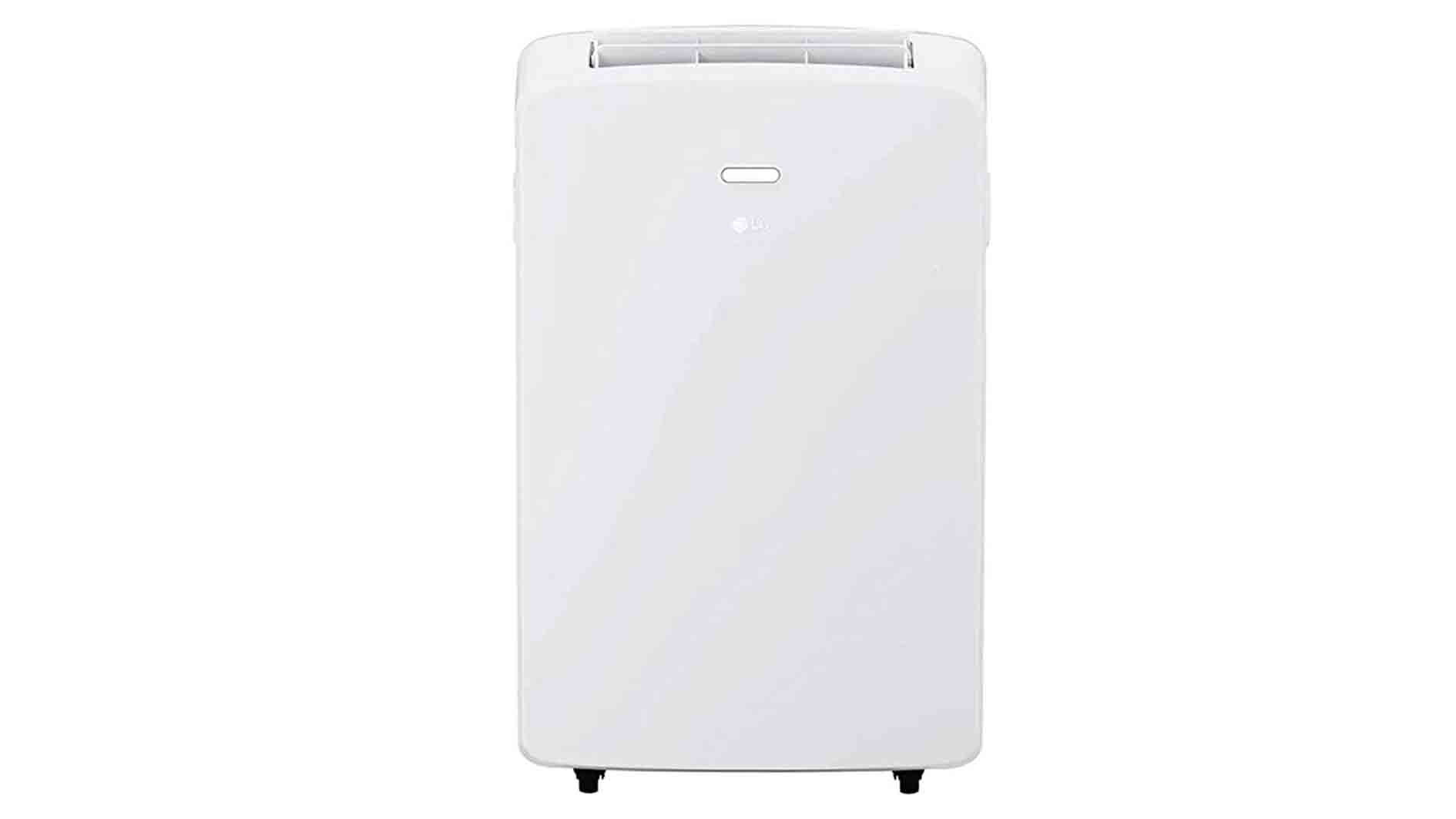
LG LP1017WSR Portable AC Unit
Our expert review:
Specifications
Reasons to buy
Reasons to avoid
The LG LP1017WSR portable air conditioner is one of the best out there thanks to its 10,000 BTU and 1,270W of power that's good for around 300 square feet of space. This is pumped out of a relatively light 59.5lbs unit which is able to keep sound output down to 53dB when working.
This compact unit can also lower the humidity in your room by pumping out up to 2.5 pints per hour and has an auto evaporate function as well as a handy remote control. There is also a water collection tank and the ability to pipe that directly out as you can do with the air pipe which comes in the provided window fitting kit.
- Read our LG LP1017WSR review
5. Honeywell 470-760CFM: Best portable air conditioner for dry climates
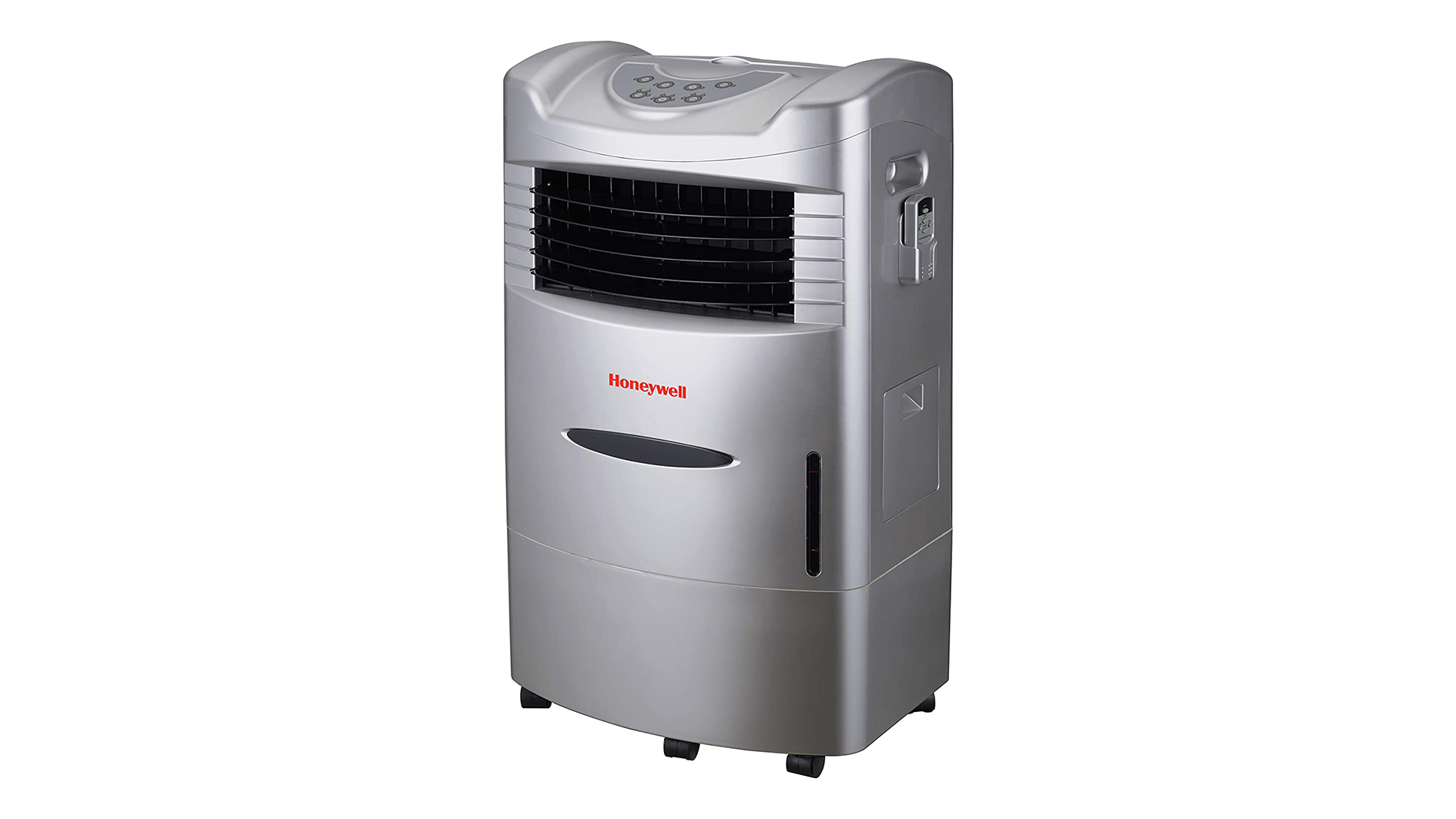
Honeywell 470-760CFM Portable Evaporative Cooler
Our expert review:
Specifications
Reasons to buy
Reasons to avoid
The Honeywell Portable Evaporative Humidifier works a little differently than a traditional portable air conditioner unit. Designed to efficiently cool down homes in dry climates and those where the humidity is below 60%, the humidifier is best suited to dry or desert regions because it adds humidity to the air rather than extracting it.
Powerful enough to cool down 280 square feet, this unit is best suited to small or medium-sized spaces. Conveniently, the unit also weighs just 23.4lbs, making it a lightweight option that can be hauled around or slotted into a small space.
Conveniently, the Honeywell Portable Evaporative Humidifier has three modes rolled into one, including an air cooler, fan and humidifier. Despite its several functions, it’s still designed to be energy efficient, meaning users should save a little on energy costs.
6. Whynter Elite ARC-122DS: Best portable air conditioner for efficiency
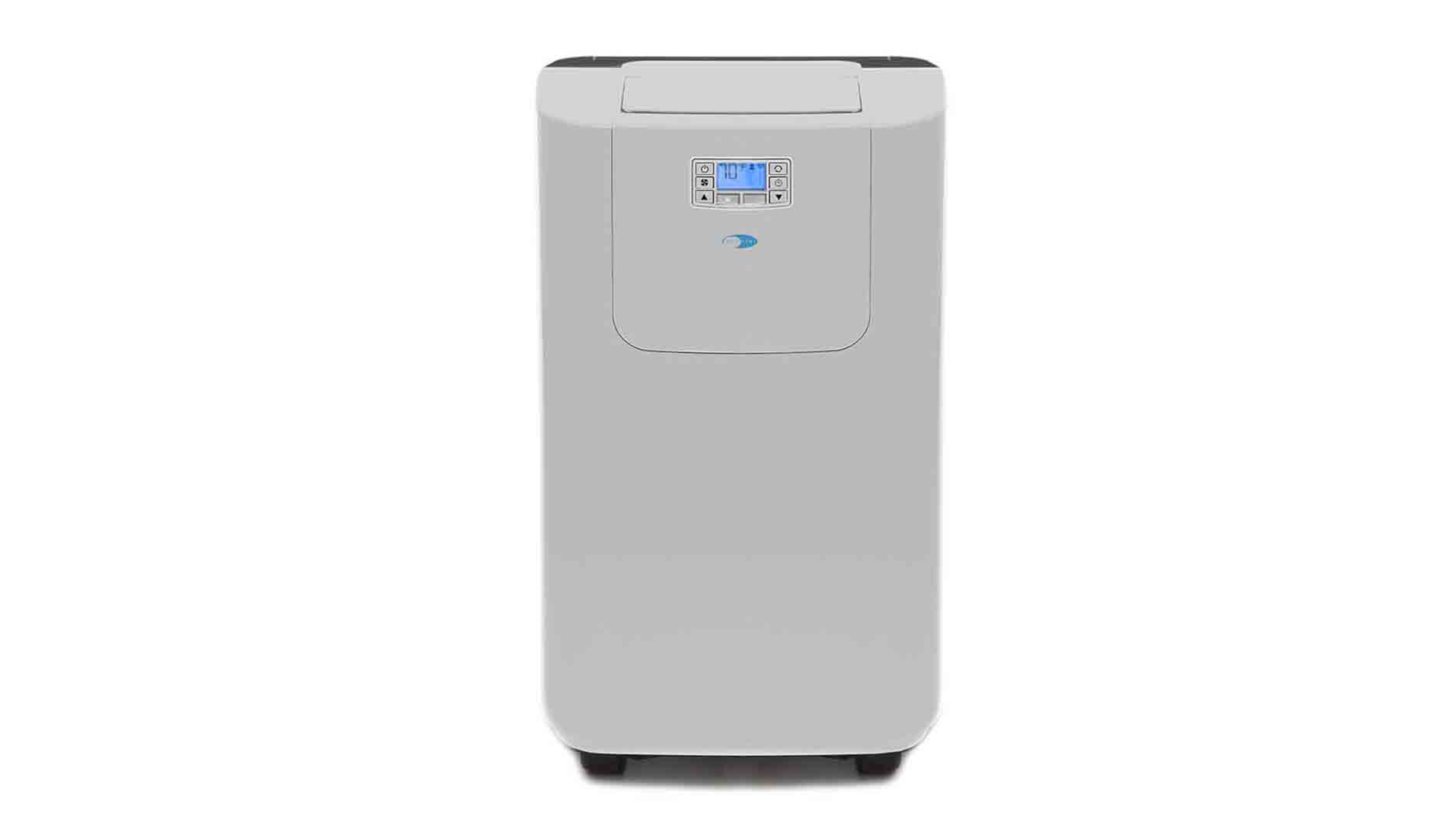
Whynter Elite ARC-122DS
Our expert review:
Specifications
Reasons to buy
Reasons to avoid
The Whynter Elite ARC-122DS is a pretty unique portable air conditioner because it uses two hoses, one to pump hot air out and the other to draw cool air in. The result is a quiet running unit which is super efficient.
That should mean that it saves you money on long-term running costs while also keeping its weight down to an easily maneuverable 60lbs, despite 12,000 BTU of power and a 1,080W system good for 400 square feet.
Water removal is also impressive here with up to 3.17 pints per hour which is 76 pints per day – although the hose for this is sold separately.
- Read our Whynter Elite ARC-122DS review
7. Toshiba RAC-PD1011CRU: Best portable air conditioner for smaller spaces
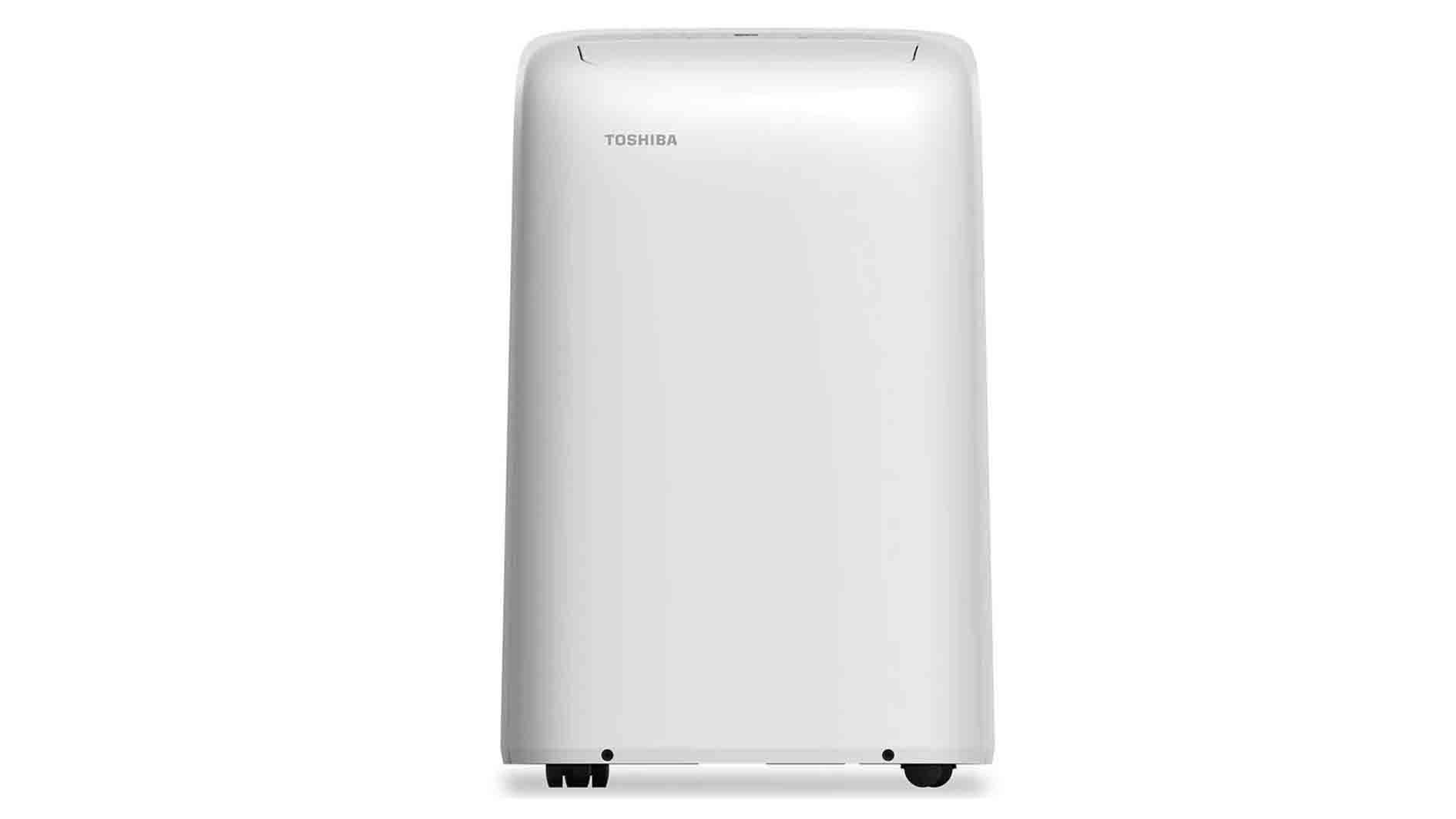
Toshiba RAC-PD1011CRU Portable AC Unit
Our expert review:
Specifications
Reasons to buy
Reasons to avoid
The Toshiba RAC-PD1011CRU is a great portable air conditioner for smaller rooms with 10,000 BTU at 1,130W which is good for around 300 square feet of space. This makes the unit light on your electric bills and also means it's nice and quiet when running at just 46dB.
At 60lbs this isn't heavy or light but the four caster wheels make that largely irrelevant as it's nice and easy to move about. The LCD remote control means that wherever this is placed, you can easily control it from afar.
- Read our Toshiba RAC-PD1011CRU review
8. Haier HPP08XCR: Best affordable portable air conditioner
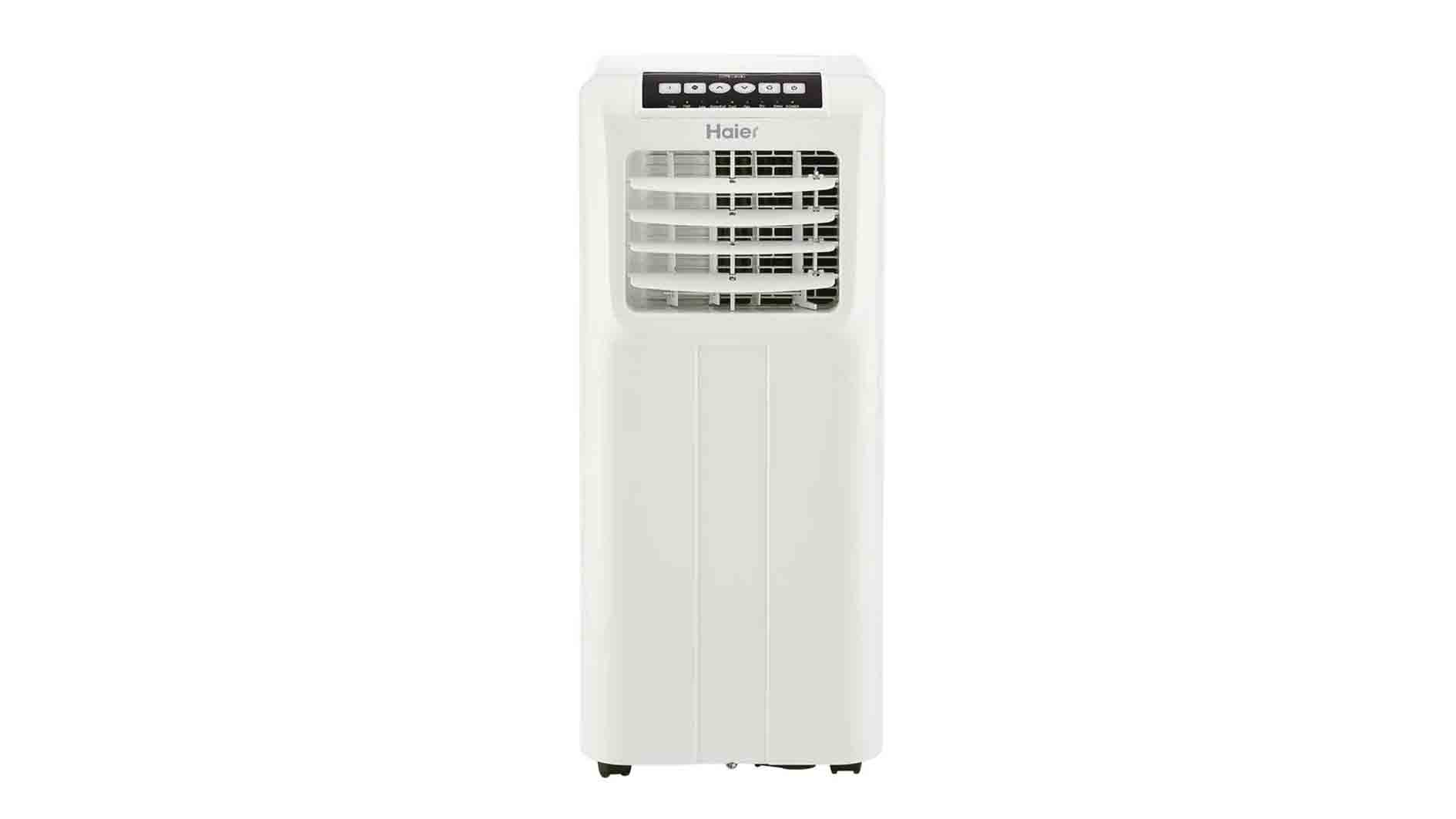
Specifications
Reasons to buy
Reasons to avoid
The Haier HPP08XCR is a smaller portable air conditioner which makes it more affordable than many. As such you get 8,000 BTU which is good for a room space of around 200 square feet.
But this will work without using as much electricity as bigger units, also making this more affordable in the longer term. You can still enjoy features like dehumidifying for 3.58 pints per hour, a remote control and a 24 hour timer.
- Read our Haier HPP08XCR review
The best portable air conditioners: FAQs
How to choose the best portable air conditioner
When looking to buy a portable air conditioning unit, there are some key considerations you need to make, as well as some jargon you need to get to grips with. Here's what you need to look for before you buy a portable AC unit.
BTU stands for British Thermal Unit and is basically a means to measure heat. Air conditioners use BTU to measure how much heat an air conditioning unit can add or remove from a room in the space of an hour. The higher the BTU rating, the quicker the unit will remove the warm air.
Hose length is an important consideration before buying a portable air conditioner. All portable air conditioners need to vented outside through a window. If you have furniture in front of the window, a longer hose is needed to be able to vent heated air outside.
Look at the space you have available and where you want to place your portable AC unit. Measure this distance to make sure the hose is long enough. We would recommend portable AC units with a hose length of 5 feet or more for the maximum flexibility.
Remember, portable AC units are noisy. They use motorized fans and compressors that create a flow of air. If you are looking for a quieter unit for the bedroom, or something that you can hear the television over, we recommend you check the decibel levels before buying.
Are air conditioners with a high BTU always better?
You should always calculate the BTU you need for the space, and buy a portable air conditioner that is capable of cooling that air. An air conditioner with a high BTU rating will cool a small space quickly, and cycle off. This could cause the temperature to climb again, and you’ll need to restart the machine.
This is not only frustrating, but by turning the machine on and off in a small amount of time it can cause extra wear and tear on the air conditioner’s compressor, shortening the lifespan of your portable air conditioner. So, a higher BTU is not always the sensible option.
But you should always err on the side of having the BTU rating being slightly higher, as choosing an air conditioner with a lower BTU for the space might mean you will never reach your the most comfortable temperature.
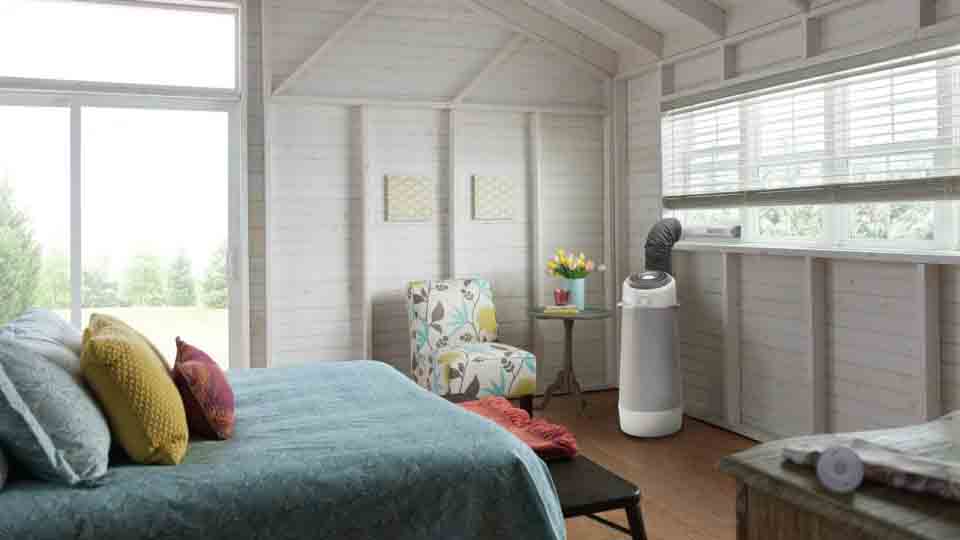
How to calculate the BTU needed for room size
BTU rating is used to calculate the maximum room size for an air conditioner. First up, you need to measure the room you plan to use the AC unit in. Once you've done that, you can use this handy chart from Energy Star to determine the BTU you need.
This is just an average, and there are other factors that will affect the calculation. If you are on a higher floor, the heat typical raises too or the room is in direct sunlight it best to adjust the air conditioners BTU rating by 10%.
In rooms that are naturally shaded, and not exposed to sunlight you can reduce the BTU rating by 10%. However, it is best to err on the side of caution and have a higher BTU than not enough.
In rooms where there are heat sources, like an oven in a kitchen, it is advised you add 4000 BTU onto the rating of the portable air conditioner to counter your appliances.
Apart from room size, you can also look over the unit's other power specifications such as power level, air flow, moisture removal and fan modes, all of which determine the effectiveness of a portable air conditioner. However, comparing room size against the BTU is the best indicator. In general, higher values mean higher performance, though the most powerful machines often have lower energy efficiency.
Are the best portable air conditioners energy efficient?
For efficiency, we looked at each unit's Energy Efficiency Ratio (EER) as provided by the manufacturer. This tells you how much energy it uses when compared with its output power. Among the units we reviewed, the highest EER rating we found is 11.1 while the average rating is 9.84.
You can expect to save money on your electric bill if you choose a machine with higher EER ratings. In general, portable AC units aren't as efficient as other types of air conditioners, but they are great for cooling specific areas in your home or apartment.
We also calculated the estimated cost to run a unit eight hours a day for a year using the national average cost of electricity. While this is a practical way to see long-term costs, it differs from the EER because weaker units sometimes cost less to run than more efficient units that are also more powerful.
What is the average warranty on a portable air conditioner?
There are two types of warranties on portable air conditioners: one for the compressor and another for parts. Because the compressor is the most essential component, it should have as long a warranty as possible.
The average compressor warranty is three years, but the best units – such as those from Frigidaire, Haier and Honeywell – have five years of warranty coverage. You can expect a minimum compressor warranty of one year. With parts warranties, also called appliance warranties, you can expect one year of coverage from the manufacturers in our comparison.
We also advise you to check how the warranty works. Some companies, like Whynter, require you to send the product to California to be fixed or replaced. As portable air conditioning units are heavy, this is an expensive cost, and postage fees can be as much as a new machine.
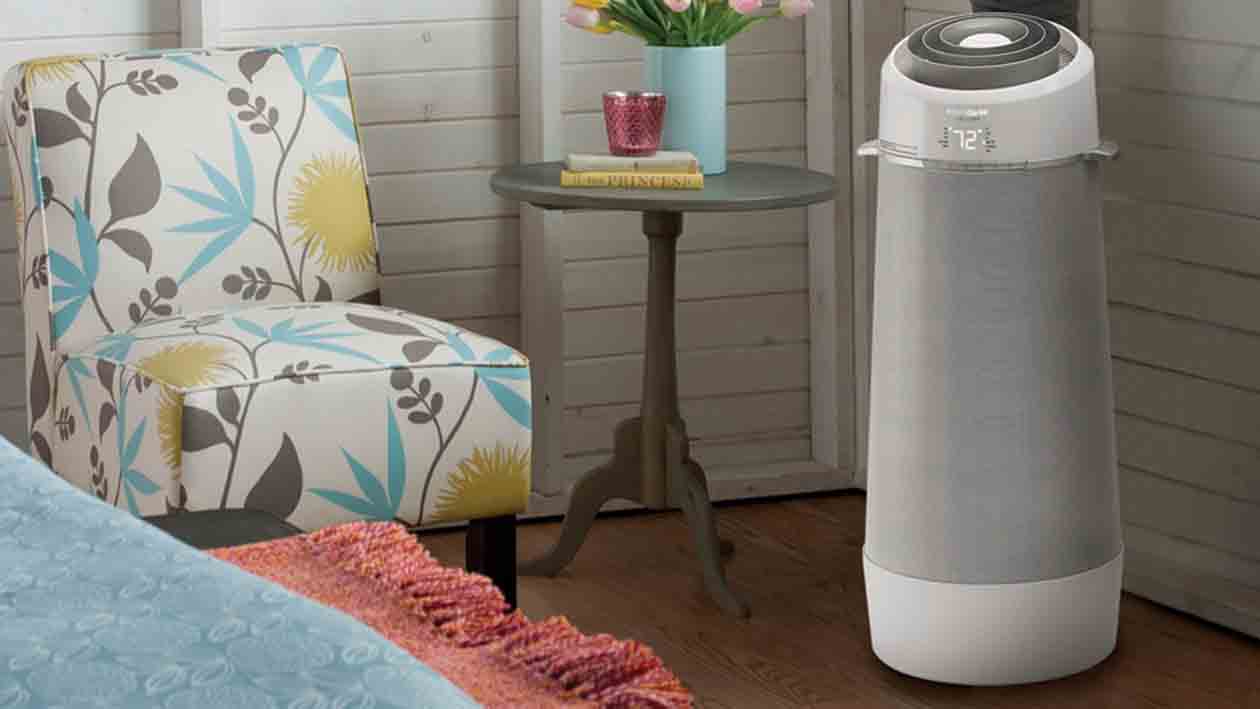
Single vs dual hose portable air conditioning units
There are no hoseless portable air conditioners. A single hose portable AC has one hose. The compressor uses this hose to pump the hot air it has extracted from your room outside. A single hose design is considered effective than a dual hosed portable AC unit because it creates negative pressure.
Negative pressure means that is easier for the warmer air from outside to find its way back inside your room, meaning the air conditioner has to worker harder to keep your room cool. This lower the efficiency of the AC unit compared to dual hose systems.
Single hose portable air conditioning units are cheaper to buy, and cost less to run. This is a great choice for people who value budget over efficiency as it saves you money in two ways.
Dual hose portable air conditioners have two hoses. One hose is designed to pump hot air from the room, while the other pumps in cold air. This system is designed to stop the buildup of negative pressure, making it more efficient. This means they are excellent at lowering the temperatures, and are usually the better performing portable air conditioners. But this performance comes at a higher initial cost, and electric bill.
Do portable air conditioners have to be vented out a window?
A lot of people have difficulty installing a portable air conditioning unit, especially if they have vertical windows. Before purchasing a portable AC read a few reviews to see how easy it was to adjust the window kit to the style of window you will be venting through. You may have to trim window kits that are bigger than your window’s opening or add plywood frame for those openings that are bigger.
Reviews
Whirlpool 24" Stainless Steel AI Dishwasher Review
Napoleon TravelQ PRO285 Portable Gas Grill review
Dreame L40 Ultra Robot Vacuum Cleaner and Mop review: almost hands-free cleaning
GE Profile Smart Mixer with Auto Sense review: a powerful, thorough mixer
Echo eForce DPB-2500 review: a leaf blower as a snow removal tool?
DPAS-2100 + Pro Paddle Attachment review: a new way to remove snow this winter?
Midea MAD53109APK 5.5QT Air Fryer review: a small, simple, and highly effective option
Eureka J15 Pro Ultra Robot Vacuum review: hands-free cleaning for busy families
Air conditioners work by pulling humidity and heat from the air and venting it somewhere else. In a typical window air conditioner or central AC unit, the hot air is released into the outside air near the unit.
Portable air conditioners work a little differently. If it released equal amounts of hot air as cool air into the room, there would be no cooling effect, making them expensive noise machines. They use an insulated exhaust hose to move heat waste through a nearby window.
If a portable air conditioner worked the same way, it would release as much hot air, if not more, as it would cold air into a room, essentially negating any cooling in the room. Because of this, portable air conditioners use an insulated exhaust hose to transfer waste heat to a nearby window.
No exhaust hose is perfect, so some of the heat leaks into the surrounding room before it leaves the window. This is why portable air conditioners are considered the least efficient type of air conditioner on the market. When it comes to home air conditioners, portability always comes at the cost of energy efficiency.
There are alternatives to portable air conditioners, in case you don’t have a window for ventilation, such as tower fans and portable evaporative coolers, though these don’t cool rooms much compared to a proper air conditioner.
Do you have to drain a portable air conditioner?
While most portable air conditioners have an automatic evaporation system, most still need a little help getting rid of all the water. Automatic evaporation systems move the condense water to area where it evaporates and gets blown out with the exhaust hose. However, in our experience, this system doesn’t always operate as well as it should, and does require emptying.
No. While it’s true that moisture collects in a portable air conditioner, modern units have an automatic evaporation system. This moves water collected from the air inside your home to the other side of the AC unit where it evaporates and gets blown out through the exhaust hose, along with excess heat.
Do portable air conditioning units have filters?
Most portable air conditioning units have filters.These filters are designed to remove dust and particles from the air and prevents them from damaging the machine.
Regularly cleaning these filters will prolong the life of your portable AC unit. If dirt is allowed to gather, it forms a crust on the coil, which will stop it from pumping the heat outside. This can cause the compressor to overheat, and stop working.
Don’t use soap to clean the filters, as this can leave the filter sticky, and cause a rapid build up of dust. When cleaning the filters, it is also recommended that you clean the vents on the machine too, as the fans can suck in dust.
How long do portable air conditioners last?
Depending on how well you maintain your portable air conditioner, you can generally get between 5 and 10 years of service. Pay close attention to the warranty on the compressor, as this is a good indicator of how long the unit will last.
You can expect portable AC units to last longer than the warranty if you keep up with basic maintenance tasks, such as cleaning filters and winterizing the unit when you put it away for the season. For guidance on how to conduct maintenance, refer to the owner’s manual that comes with your air conditioner.
It should be noted there are a large number of complaints about durability of portable air conditioners across all brands, and models. There are a large number of factors that can result in a lower than expected life span. When buying a portable air conditioner we always recommend you choose one with the best warranty.
Sign up to receive the latest news, reviews, buying guides and deals direct to your inbox
Luke is a veteran tech journalist with decades of experience covering everything from TVs, power tools, science and health tech to VPNs, space, gaming and cars. You may recognize him from appearances on plenty of news channels or have read his words which have been published in most tech titles over the years. In his spare time (of which he has little as a father of two) Luke likes yoga, surfing, meditation, DIY and consuming all the books, comics and movies he can find.

